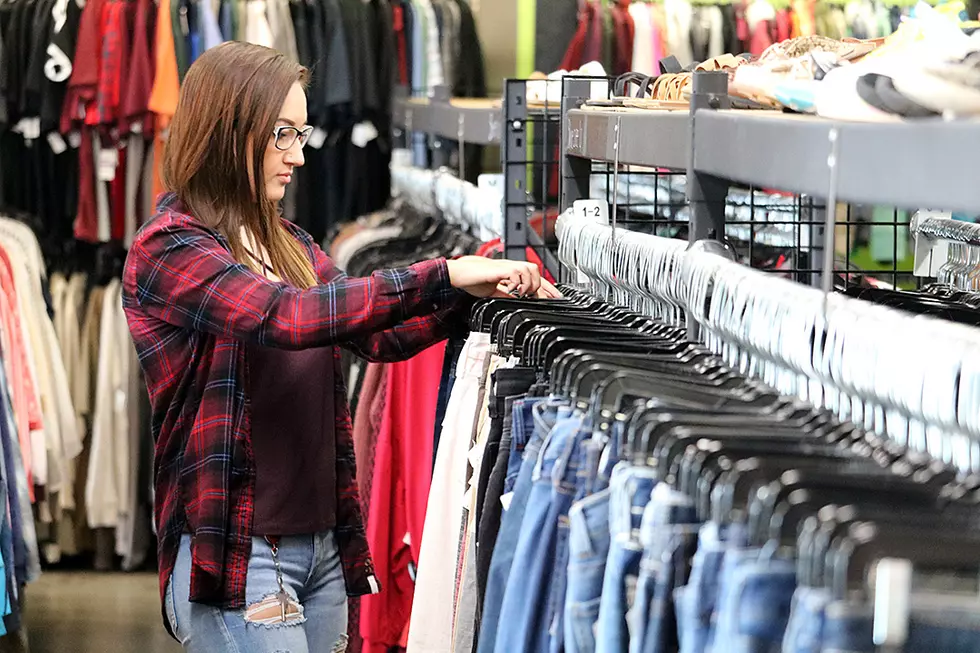
Missoula-area thrift stores plagued by after-hours “donations”
On Tuesday mornings, Melissa Ameline digs through piles of trash to get to work.
Secret Seconds, a YWCA-affiliated thrift store in Missoula, is closed on Sunday and Monday, but the donations don’t stop coming when they’re closed, despite signs discouraging dumping.
By Tuesday, the door is often blocked, so Ameline and her coworkers start processing donations before they can even enter the building.
“We’ll throw our bags down, and it’s like ‘ok, let’s double team this old broken rocking chair without cushions,’ ” said Ameline. “That’s a lot of what gets left overnight, the broken furniture, the gross peed-on mattresses.”
This isn’t unique to Secret Seconds.
Thrift stores across Missoula are plagued by after-hours drop-offs, which cause additional strain to an industry already struggling with labor shortages.
Ameline, an assistant manager who has worked at Secret Seconds since 2013, said donations have doubled over the last two years as the pandemic kept people at home, face to face with all their belongings. The increase in donations has forced Secret Seconds, which has two stores in Missoula but limited storage capacity, to limit donation days.
Until 2020, Secret Seconds was open for donations every day of the week, but the rise in pandemic donations and labor shortages forced them to close on Sunday and Monday.
On a Friday in late October, Secret Seconds received 46 donations within two hours, Ameline said. Management is considering closing Secret Seconds for an hour every morning to allow employees more time to catch up.
Mark Rathbun, who owns the Donation Warehouse in Missoula, which specializes in second-hand furniture and appliances, also doesn’t have enough space to keep up with increased donations. He has three shipping containers behind his business to increase his storage capacity and has gotten much pickier about the donations he accepts.
But after hours, people make their own rules, and at least once every two weeks, Rathbun finds old mattresses and unusable furniture stashed behind his building. Rathbun founded the Donation Warehouse in late 2010 and has seen dumping get progressively worse over the last decade. He’s found that trash attracts more trash, so he and his employees start each day by hiding whatever has been dumped the night before.
“We stuff it between the shipping containers behind the building so people can’t see it until I get rid of it,” he said.
Rathbun has put up signs and installed $6,000 in surveillance cameras, which occasionally provide him enough information to report dumpers, but he’s resigned to the piles of junk that fill up his back alley.
The larger the business, the bigger the problem. Goodwill Missoula employees often find 4,000 pounds of “mess” blocking their donation lanes, according to Jason Asher, an assistant vice president for Easterseals-Goodwill Northern Rocky Mountain, which runs 21 Goodwill stores across the Mountain West.
“Anything left outside, if it gets wet or if animals get into it, goes straight to the trash,” Asher said.
The nonprofit donates much of its proceeds to support Americans with disabilities and employment barriers. Trucking junk donations to landfills costs the organization money, which harms its mission.
Asher doesn’t want to discourage donations, and believes that, for the most part, people who are leaving goods after-hours are legitimately trying to donate to his organization.
At the same time, Asher, who is in contact with Goodwill stores across the nation, knows it could be even worse. He’s seen photos and talked to counterparts in Seattle and Indianapolis who tell him that they are overwhelmed with dumping. So even while his employees clear away thousands of pounds of unusable product each morning, he tries to stay thankful.
“I don’t want to say that our area’s just intrinsically more altruistic and people are more willing to wait, but I have to wonder if that’s part of it,” said Asher.
Carly Waude, program director at Home Resource, a community sustainability nonprofit in Missoula that also has a building materials reuse store, is similarly positive, despite also dealing with after-hours dumping. “I think people are like, ‘Oh, they want this stuff. And they're not open. I'm going to leave it here for them,’ ” Waude said.
Home Resource, which helped the City of Missoula draft its zero-waste plan, is committed to encouraging what Waude calls a circular economy. Waude thinks part of the dumping problem stems from an inconvenient donations system. People who want to donate often travel to multiple stores to find a place that accepts their type of donation.
And even if people do know that their donation isn’t usable, they may also not have the money or time to go to the dump, Waude said. “We live in a society where things are disposable and time is money. Our society is built up all kinds of wrong for this.”
Ameline, at Secret Seconds, said 75% of donations are unusable. The store has run out of storage space and is shipping extra clothing to Seattle for recycling, when they can find trucks and truckers willing to haul it.
The store had to get an extra dumpster to deal with the sheer amount of trash they process, which fills two full-size dumpsters per day. All these issues force them to shorten their donation hours, which means less legitimate donations and more time for dumping.
Ameline stands at the cash register helping customers. A 10’ tall mound of unsorted clothing looms behind her, only a small portion of the goods to be processed before the next morning brings new donations, some dumped at their doorstep.
“We keep hoping that it’s going to slow down. Maybe after winter, if we’re lucky.” Ameline said. “But we’re doing the best we can.”
